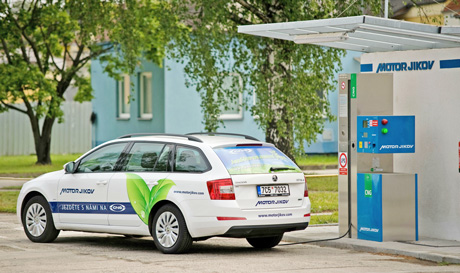What does Professor Jan Macek, Associate Dean for Scientific and Research Activities at the Faculty of Mechanical Engineering at the Czech Technical University (ČVUT), and former head of the Department of Automobiles, Internal Combustion Engines, and Rail Vehicles, as well as the Josef Božek Center for Sustainable Mobility, envision for the future of CNG?
Are you involved, among other things, in a project developing engines powered solely by natural gas? What advantages do they have over the currently used “hybrids”? What impedes their broader adoption?
A dedicated engine powered exclusively by compressed natural gas (CNG) offers several benefits over existing solutions. CNG has a high octane number, burns very slowly, and is less prone to knocking. It can withstand higher compression ratios, resulting in higher engine efficiency. Converting a petrol engine to run on gas while maintaining the ability to operate on petrol reduces this advantage. Compared to current solutions, such engines consume approximately ten percent less fuel, leading to increased range or smaller pressure tanks. Naturally, a drawback is the need for a sufficiently dense network of refueling stations, as there is no petrol reserve in the vehicle.

What is your outlook on the future of CNG as a fuel?
CNG has an environmental edge over gasoline, primarily due to lower carbon dioxide (CO2) emissions, which contribute to the greenhouse effect. This is due to two factors: higher calorific value and fuel composition—where the chemical energy in natural gas is mostly linked to hydrogen and contains fewer carbon atoms. Approximately 85 percent of the mass of gasoline’s carbon atoms consists of carbon, whereas in methane (natural gas), it’s about 75 percent. During combustion, less CO2 is produced with CNG because less gas is consumed, owing to its higher calorific value. When using engines dedicated solely to CNG, additional savings are achieved thanks to higher efficiency. Thus, compared to conventional petrol engines, results are consistently better.
Another advantage of CNG is its ignitability over a broader range of concentrations and mixture compositions. We can opt for leaner mixtures with excess air. Development of ignition systems capable of reliably igniting very lean mixtures that produce low combustion temperatures—again reducing heat loss to the walls—is underway. The challenge lies in that exhaust gases from lean mixtures contain oxygen, making it impossible to utilize a three-way catalyst, an efficient and cost-effective method of reducing nitrogen oxides emissions. Other solutions exist but tend to be more expensive. Regarding CO2 emissions, since 2020, automakers face hefty fines for exceeding limits, making dedicated CNG engines a promising alternative. As a result, most car manufacturers are intensively investing in this area.

What about vehicle safety from an energy source perspective? Recently, reports of CNG tank explosions in VW vehicles might have damaged the reputation of CNG as a safe fuel. How does this compare to electric vehicles?
Using CNG is generally a very safe solution. In terms of accident risk, gas cylinders are robust; I am not aware of any explosion incidents involving gas cylinders igniting during car crashes. There have been cases of pressure vessel rupture during refueling, but these typically involved poorly maintained vehicles with internal corrosion.
Conversely, with electric vehicles, we have limited experience of how batteries behave in accidents. Incidents of battery fires have been reported with mobile phones, laptops, electric skateboards, and even aircraft. Highly compact batteries place electrodes in close proximity, and mechanical deformation—such as an accident—can cause internal short circuits. The vehicle’s monitoring system must detect voltage or internal resistance deviations in series-connected cells; overburdened cells are then disconnected to prevent overheating. Overheating, internal shorts, or accidents can lead to battery casing breaches, allowing oxygen to contact lithium, resulting in rapid reactive reactions. Unfortunately, casing breaches might become evident only weeks after an event.
Furthermore, the coming period—when batteries will be replaced en masse—poses risks, as demand for cheaper, lower-quality batteries is likely to rise. Longer-term, extensive use of electric vehicles will provide further insights and experience regarding their safety.
+125
years in the market
Kickstart your career at Motor Jikov – take a look at our job openings and get in touch with us.
MOTOR JIKOV Group a.s. company utilizes the opportunity to draw funds from European program grant resources.